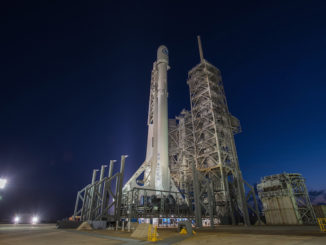EDITOR’S NOTE: Updated with orbital parameters, and identities of the U.S. Air Force Command satellites.

Rocket Lab’s next launch from New Zealand in August will carry four small spacecraft into orbit for BlackSky’s Earth-imaging constellation, the U.S. Air Force, and a French startup developing a fleet of maritime surveillance satellites, the company announced Monday.
A two-stage Electron rocket, fitted with a Curie kick stage on top, will lift the four satellites into low Earth orbit several hundred miles above Earth. In a statement announcing the launch, Rocket Lab did not release the target altitude or inclination for the mission — the company’s fourth of the year.
Three of the satellites launching next month from New Zealand are riding to space through an agreement brokered by Spaceflight, a Seattle-based company that aggregates small satellites on rideshare missions.
A spokesperson for Spaceflight said the Electron rocket and Curie kick stage will inject the satellites into a 335-mile-high (540-kilometer) orbit inclined 45 degrees to the equator.
The fourth spacecraft in BlackSky’s fleet of commercial Earth-observing microsatellites will launch on the Electron rocket, joining two satellites launched last year, and a third delivered to orbit on the most recent Rocket Lab mission June 29.
BlackSky is a sister company of Spaceflight, with aims to eventually build and launch 60 Earth-imaging satellites to enable frequent revisits over the same location to help analysts identify changes over short time cycles.
The first batch of BlackSky’s surveillance satellites weigh around 123 pounds (56 kilograms), and each spacecraft can capture up to 1,000 color images per day, with a resolution of about 3 feet (1 meter).
After the launch of the BlackSky Global 4 satellite in August, BlackSky will begin deploying a new set of 20 privately-funded optical surveillance satellites built in Washington by LeoStella, a joint venture between BlackSky’s parent company Spaceflight Industries and Thales Alenia Space, a European satellite manufacturer.
BlackSky holds a contract with the National Reconnaissance Office, which owns the U.S. government’s spy satellites, to allow government analysts to evaluate the utility of commercial imagery in intelligence-gathering and overhead surveillance.
Rocket Lab said two experimental satellites for Air Force Space Command will fly also fly on the Electron launch next month, which the company has nicknamed “Look Ma, No Hands.”
The Air Force smallsats, which Rocket Lab did not identify, are “designed to test new technologies including propulsion, power, communications, and drag capabilities for potential applications on future spacecraft,” Rocket Lab said in a statement.
Spaceflight said the two 6U CubeSats are part of Air Force Space Command’s “Pearl White” technology demonstration program. The two CubeSats were built and will be operated by Tiger Innovations, a company based in Washington, D.C.’s Virginia suburbs.

A French startup named UnseenLabs will launch its first satellite on the Rocket Lab Electron booster next month. The briefcase-sized six-unit CubeSat, named BRO-ONE, was built by the Danish smallest manufacturer GomSpace.
The BRO-ONE mission is the first spacecraft in a planned constellation of CubeSats for maritime surveillance. UnseenLabs says its fleet of nanosatellites will be able to locate and identify ships around the world, providing tracking services for maritime operators and helping security forces watch for pirates and smugglers.
The launch next month will be the eighth flight of Rocket Lab’s Electron rocket since May 2017.
“Our focus is on providing a frequent, reliable, and precise launch service, whether small satellite constellation operators want to fly as a dedicated payload or as part of a rideshare mission,” said Lars Hoffman, Rocket Lab’s senior vice president of global launch services. “Rocket Lab’s innovative kick stage enables a level of flexibility and precision that simply wasn’t available to small satellite operators until Electron began orbital launches 18 months ago. We’re proud to be delivering that service to orbit every few weeks now.”
Email the author.
Follow Stephen Clark on Twitter: @StephenClark1.



